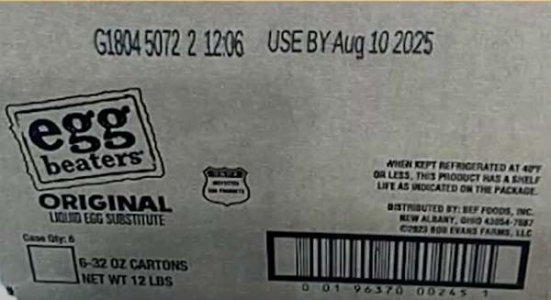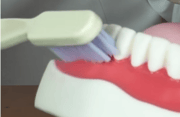Are your eggs contaminated? The shocking truth behind the urgent recall!
- Replies 0
Attention, egg enthusiasts and breakfast lovers! A staple of your morning routine might be under siege, and it's not the usual suspect of high cholesterol.
This time, it's a potential chemical contaminant that's causing a stir in kitchens across the nation.
If you've recently purchased liquid egg products, you'll want to read on to ensure your next omelet isn't served with a side of unwanted chemicals.
The Recall Rundown: What You Need to Know
Michigan's own Cargill Kitchen Solutions has issued an urgent voluntary recall on several of its pre-beaten egg products.
The reason? A possible contamination with a cleaning solution containing sodium hypochlorite, better known as the main ingredient in household bleach.
This isn't just a minor oopsie—sodium hypochlorite is a potent disinfectant that, if ingested, can wreak havoc on your body.
The Centers for Disease Control and Prevention (CDC) doesn't mince words when it comes to the dangers of consuming sodium hypochlorite.
Severe tissue damage, rapid hemolysis (destruction of red blood cells), ulceration, and in extreme cases, death, are all on the list of potential effects.
It's serious business, and not something you'd want anywhere near your breakfast table.
Which Products Are Affected?
The recall spans a variety of 32-ounce cartons, including:
Read more: URGENT: FDA upgrades recall of canned tuna – now poses severe botulism risk
If you have any of these products in your fridge, check for the establishment number “G1804” printed near the “use by” date. This number is the key indicator that your eggs may be part of the recall.
The Scope and Safety Measures
The affected products were shipped to distributor locations in Ohio and Texas and foodservice locations in Arizona, California, Colorado, Florida, Illinois and Iowa.
Over 200,000 pounds of liquid eggs have been pulled from shelves in this recall, and there's a chance they were distributed nationwide.
The USDA's Food Safety and Inspection Service (FSIS) has been on the case, and while they don't anticipate any adverse health effects from consumers, they're not taking any chances.
Thankfully, no reports of illness have surfaced yet. But the FSIS is adamant: if you have these products, don't eat them.
Foodservice locations are also advised not to serve them. The best course of action is to toss them out or return them to the store where you bought them.
How Did This Happen?
The FSIS was tipped off about the potential contamination, which led to an investigation and a thorough assessment of the cleaning solution involved.
The result was a Class III recall, which, in regulatory speak, means that while the product violates standards, it's not expected to cause adverse health consequences.
Read more: Check your pantry: This popular snack's recall may affect your state
Understanding Sodium Hypochlorite
Sodium hypochlorite is a chemical compound made from sodium, oxygen, and chlorine.
It's a champion at killing harmful bacteria, which is why it's commonly used in cleaning products. However, high exposure levels can be dangerous.
Poison Control warns that bleach can cause burns, tissue damage, and in severe cases, more catastrophic health issues.
The FSIS has determined that the contamination level in these egg products is not high enough to pose the most severe health risks.
However, if you believe you've consumed any of the recalled products and feel unwell, it's crucial to seek medical advice.
 We at The GrayVine are committed to keeping you informed and safe, especially when it comes to the food you love. Have you been affected by this recall? Do you have any tips for ensuring food safety at home? Share your experiences and advice in the comments below. Let's work together to keep our meals safe and our mornings worry-free!
We at The GrayVine are committed to keeping you informed and safe, especially when it comes to the food you love. Have you been affected by this recall? Do you have any tips for ensuring food safety at home? Share your experiences and advice in the comments below. Let's work together to keep our meals safe and our mornings worry-free!
Read next: This fizzy favorite just got a recall of more than 10,000 cans—here’s why
This time, it's a potential chemical contaminant that's causing a stir in kitchens across the nation.
If you've recently purchased liquid egg products, you'll want to read on to ensure your next omelet isn't served with a side of unwanted chemicals.
The Recall Rundown: What You Need to Know
Michigan's own Cargill Kitchen Solutions has issued an urgent voluntary recall on several of its pre-beaten egg products.
The reason? A possible contamination with a cleaning solution containing sodium hypochlorite, better known as the main ingredient in household bleach.
This isn't just a minor oopsie—sodium hypochlorite is a potent disinfectant that, if ingested, can wreak havoc on your body.
The Centers for Disease Control and Prevention (CDC) doesn't mince words when it comes to the dangers of consuming sodium hypochlorite.
Severe tissue damage, rapid hemolysis (destruction of red blood cells), ulceration, and in extreme cases, death, are all on the list of potential effects.
It's serious business, and not something you'd want anywhere near your breakfast table.
Which Products Are Affected?
The recall spans a variety of 32-ounce cartons, including:
- Egg Beaters Original Liquid Egg Substitute (use by August 10, 2025)
- Egg Beaters Cage-Free Original Liquid Egg Substitute (use by August 9, 2025)
- Egg Beaters Cage-Free Original Frozen Egg Substitute (use by March 7, 2025)
- Bob Evans Better'n Eggs Made with Real Egg Whites (use by August 10, 2025)
Read more: URGENT: FDA upgrades recall of canned tuna – now poses severe botulism risk
If you have any of these products in your fridge, check for the establishment number “G1804” printed near the “use by” date. This number is the key indicator that your eggs may be part of the recall.
The Scope and Safety Measures
The affected products were shipped to distributor locations in Ohio and Texas and foodservice locations in Arizona, California, Colorado, Florida, Illinois and Iowa.
Over 200,000 pounds of liquid eggs have been pulled from shelves in this recall, and there's a chance they were distributed nationwide.
The USDA's Food Safety and Inspection Service (FSIS) has been on the case, and while they don't anticipate any adverse health effects from consumers, they're not taking any chances.
Thankfully, no reports of illness have surfaced yet. But the FSIS is adamant: if you have these products, don't eat them.
Foodservice locations are also advised not to serve them. The best course of action is to toss them out or return them to the store where you bought them.
How Did This Happen?
The FSIS was tipped off about the potential contamination, which led to an investigation and a thorough assessment of the cleaning solution involved.
The result was a Class III recall, which, in regulatory speak, means that while the product violates standards, it's not expected to cause adverse health consequences.
Read more: Check your pantry: This popular snack's recall may affect your state
Understanding Sodium Hypochlorite
Sodium hypochlorite is a chemical compound made from sodium, oxygen, and chlorine.
It's a champion at killing harmful bacteria, which is why it's commonly used in cleaning products. However, high exposure levels can be dangerous.
Poison Control warns that bleach can cause burns, tissue damage, and in severe cases, more catastrophic health issues.
The FSIS has determined that the contamination level in these egg products is not high enough to pose the most severe health risks.
However, if you believe you've consumed any of the recalled products and feel unwell, it's crucial to seek medical advice.
Key Takeaways
- Cargill Kitchen Solutions has voluntarily recalled various pre-beaten egg products due to potential contamination with a cleaning solution containing sodium hypochlorite.
- Consuming sodium hypochlorite can result in severe tissue damage and potentially fatal health issues.
- Consumers are advised to check the establishment number 'G1804' on their egg product cartons to determine if they are affected by the recall.
- Although no adverse health effects are expected, the FSIS recommends that consumers not consume the recalled products and either dispose of them or return them to the place of purchase.
Read next: This fizzy favorite just got a recall of more than 10,000 cans—here’s why







